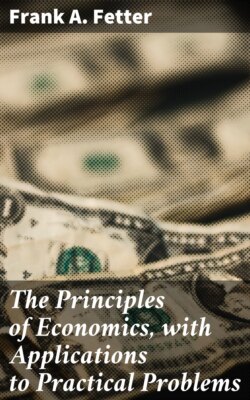Читать книгу The Principles of Economics, with Applications to Practical Problems - Frank A. Fetter - Страница 29
На сайте Литреса книга снята с продажи.
§ II. BARTER UNDER SIMPLE CONDITIONS
ОглавлениеIn isolated exchange the price is not economically fixed
1. In isolated exchange, where only two traders engage in barter, their estimates give respectively the upper and the lower figures of the ratio at which the trade can take place. Let us recall the fact that a difference in the relative estimates that men place on goods is the first essential of exchange. Those estimates may be expressed in a ratio; we may say that A will give four apples for one orange, would be glad to give fewer, but will not give more; while B will give one orange for three apples, would be glad to get more apples, but will not take fewer. The outside limits of the ratio at which the exchange must take place will, therefore, be one orange for three or four apples.
A, seller of apples, offers 4 (or fewer) apples for 1 orange.
B, buyer of apples, demands 3 (or more) apples for 1 orange.
There is, in entirely isolated exchange, therefore, a lack of definiteness in the price, much depending on what Adam Smith called the "higgling of the market." In the old-time American horse trade much depended on "bluff"; in such cases it was as important to be able to judge character as to judge horses. A thorough analysis of the trade, however, would probably show that the bargain is concluded at a point which exactly balances the hopes of gain and fears of loss of one of the parties.
Competitive bidding narrows the limits of price
2. Where one-sided competition exists, the ratio of the exchange will be somewhere between the estimates of the two buyers most eager for the last portion offered. By competition is here meant the independent seeking of the same thing at one time by two or more persons. Where there is one market price paid by a number of buyers, it may be that no two of the subjective estimates are alike; the exchange value may differ from all of their estimates, and yet must correspond closely to two. Auction sales well illustrate the principle. If there is one ax to be sold and ten possible buyers for an ax, and there is no combination among them, the bidding will go on until the estimate of the buyer next to the most eager, has been reached. The most eager buyer can then secure the ax by bidding just a little above his next competitor. But if there are ten axes and ten buyers who know that there will be ten axes offered, the more eager buyers will refuse to bid much above the less eager ones. A shrewd auctioneer, therefore, often conceals the fact that there is more than one of an article, and having sold it off, brings out a second or a third one of the same kind, thus keeping the buyers in ignorance of the supply and getting somewhere near the estimate of the most eager buyer in each case. Advertisements of "a limited supply," "the last chance," "positively the last appearance," are meant to stimulate the demand of the patrons, and to lead them to buy at once. In general, therefore, where competition exists on one side, price is fixed with greater definiteness than in isolated exchange. Not so much depends on shrewd bargaining, on bluff, or on the stubbornness of an individual. Far more depends on forces outside the control of any one man. The bidders are impelled by self-interest to outbid their competitors, and thus the limits within which the market price must fall are narrowly fixed.
Buyers fix price of perishable goods
If things already brought to market must be sold at any price that can be secured, the buyers may be said to fix the price. This does not mean that they can buy it for any sum that they wish, but it means that when each one is trying to get it as cheap as possible, their bids finally determine how much it will sell for. In such cases, therefore, the competition is for the moment one-sided.
If a part of the supply can be withdrawn and kept without great loss, this will be done if the price is low. Strawberries, fish, and meat may be sold Saturday night at any price that will secure purchasers, but every thing that can be kept with little or no depreciation will be withheld from sale for a time. It may even be of advantage to the seller to destroy a part of the supply, when the increased price of the smaller amount will give a larger total.
